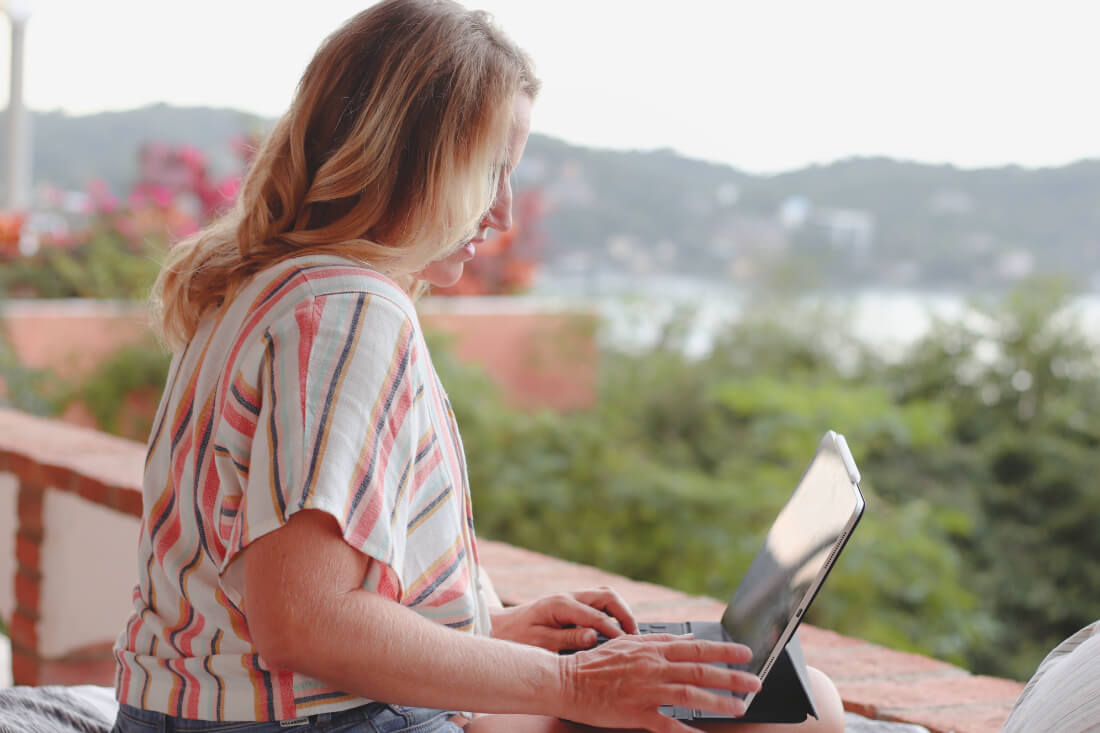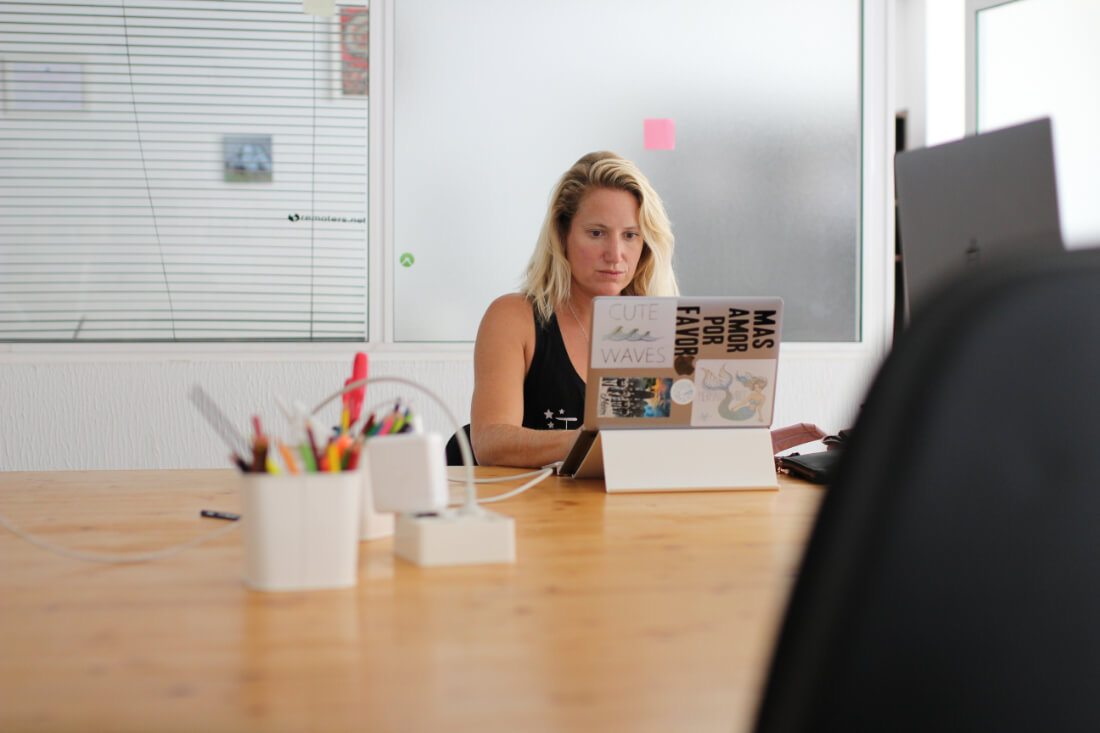Digital nomad Chel Rogerson has lots of helpful insights to share in this tell-all. Take her tips for bringing your own work on the road!
With more people working from home than ever before, digital nomad life may just be the first post-COVID travel boom. Countries such as Georgia, Estonia, Croatia, Barbados, and Bermuda are now offering digital nomad visas to attract working adventurers, making the idea all the more attractive to those of us who have (intentionally or unintentionally) found ourselves with work from home jobs.
First, the good news.
Working and having a source of income while seeing the world is undeniably wonderful.
You can experience immersion in a new culture while enjoying the sights and attractions of the places you visit, taking the experience well beyond that of a standard vacation. You can get to know the country by being a part of the community, doing your grocery shopping, your laundry, your workouts, and your everyday life along with the local residents of your destination.
This offers an opportunity to see the world from new perspectives and appreciate cultural differences from the other side of your comfort zone (where the magic happens).
Your budget has no borders.
For most of us, the cost of living will factor into our destination planning. Thankfully, there are limitless possibilities based on your income and budget.
The world’s economies vary greatly. For example, if an apartment in a European capital is out of reach, a small town in Asia or Latin America may be a good fit. You can also choose to visit places before or after their peak high-season to find better rates.
Whatever your budget, keep in mind the more you move around, the more you will spend. If you are trying to stretch a buck, choose a destination and give it several months before moving on to the next.

You can be a digital nomad at any time in life.
Digital nomads come in all forms. I’ve met families with school-aged children working abroad, I’ve met young couples, I’ve met pregnant women and families with infants, and I’ve met solo travelers of all ages. There is nothing to keep you from working abroad, no matter where you are in life.
Certain destinations may be more family-friendly or more fun for young singles or established by mature seniors, but there’s a place for everyone. Many families enjoy the perks of having affordable daycare, private international schools, and housekeeping that they couldn’t afford if they were back in their home country with a higher cost of living.
Now, a little reality check.
Not all digital nomads travel abroad; some stay in their home country but enjoy van life or house sitting to constantly visit new places.
If you do opt to go international, know that living abroad is not easy. Constantly veering from your comfort zone takes some patience, practice, and — if you are to be successful — some research. Be prepared for challenges and surprises.
Digital nomads do not live on vacation.
A vacation is what happens when you step away from daily life. Digital nomads are simply doing their daily routine (e.g., work, raising a family, dating, shopping, errands) without a fixed address. This means you won’t be sightseeing everyday.
You will meet vacationers who will mention all the day trips and places they have visited that you have yet to experience after living months in the same place.
Plan to be a weekend warrior, but also plan to just chill in place and experience your daily life in a unique way.
You won’t be working from a hammock or by a pool, at least not every day.
Trust me, I have tried everything. Sun glare, mosquitos, weather, sweat, wifi availability, and simple ergonomics will get in the way of your stock-photo-image dream of working from a hammock.
And wifi is just not great everywhere. The further you go from a cosmopolitan city towards a tropical, jungle-lined beach or a cobblestoned, quaint town, you’re likely to experience some Internet lag time and outages.
Plan on working from a table in your apartment or a co-working space, and if you happen to find a chaise lounge by a pool with an awning and a light breeze, we’ll raise our cocktail-filled coconut shell to you.

You may not be as nomadic as you’d like.
The idea behind being a digital nomad is to constantly enjoy new experiences, but more than likely you will need to spend a month or longer in a place to be your most productive. It can take several weeks to get your bearings in a new location.
This settling-in period takes away from your work productivity and, if you are working full-time, you may even need a few days off to manage your logistics.
What if your apartment’s wifi doesn’t work as expected when you arrive and you need to find a cafe until you have a wifi booster or ethernet adapter or the telecom repair technician out? (This has happened in three of my Mexican apartments!). This alone could eat up hours of your workday productivity.
You may need to take a trip to the closest city to buy some household items that you expected would come with your furnished apartment. Once you are more experienced in nomading, the adjustment period will take less time.
If you still want to go for it, here are some handy digital nomad hacks:
Maximize coworking spaces and co-living programs.
If your budget allows, coworking spaces and co-living programs can simplify your destination planning. If you plan to join a coworking space in advance, you can connect with the group for insights on finding accommodation or transportation.
When I signed up for a coworking space in Fuerteventura in the Canary Islands, I was directed to an apartment and bike rental for transportation, and the owner of the workspace even picked me up from the airport. Most of the time, I take the DIY-budget approach, but this made it much easier to hit the ground running.

A level up from co-working spaces is co-living programs, which arrange everything from your destination, housing, and wifi to placing you in a cohort so you have instant co-work companions as you move from destination to destination together.
This will simplify transitions and connect you with like-minded people, but it may keep you from exploring the culture of your location more. For example, learning a language can be difficult if you are around others speaking English all day long.
In either case, these services will instantly place you among a community of other digital nomads who will be a great resource for information and potentially become your new friends.
If the logistics of planning are overwhelming and your budget allows, coworking spaces and co-living programs can get you nomading faster.
Go to Starbucks. Shameful, but true.
Walking into a Starbucks in any country feels like instantly being transported back to the United States. Supporting local cafes is a more noble effort, but wifi is undeniably the most reliable in Starbucks worldwide. And there’s a good chance a Starbucks will be near you, as they are now in 80 countries.
In Latin America, for example, they are the only cafes with AC when the heat and humidity are unbearable. When you have an important project, the AC, excellent wifi, and overpriced coffee go a long way.
Facebook groups offer a virtual town square.
Most communities have Facebook groups for finding apartments or connecting with locals. Most places I have visited have had at least 4 or 5 groups to join. Notably, all of them seem to attract snarky dialogue from neighbors who have nothing better to do than to complain about a building being constructed, an influx of tourism, or a tree branch that was cut down.
But, weeding around the drama, you can find accommodation options, plus see what events are taking place, where to dine, and details of local goods and farmer’s markets.
Apartment searching, and searching, and searching.
If you take the DIY approach, finding an apartment could be the most challenging part of getting started as a digital nomad. The easiest place to find a fully furnished apartment with linens and a fully-stocked kitchen is Airbnb. You get the added confidence of reading reviews of previous guests as well.
But not all of these rentals are priced for long-term living and the nightly rate may not be sustainable. Also, the fees and taxes required to book with Airbnb increase the rent significantly.
Visiting a destination during the off-season will increase your chances of a long-term Airbnb score.
Beyond Airbnb, posting in Facebook rental groups and literally walking around town and asking locals or calling numbers on posters will generate some leads. If you can’t find a long-term, affordable place to stay before you arrive, don’t let it discourage you.
Book a short-term Airbnb and give yourself a couple of weeks in the destination to full-on search. If you plan to stay for a while, be open to finding a cheaper apartment that may require you to invest in your own linens, kitchen supplies, and household items.
As digital nomads, we live as minimalists with whatever we can pack in our suitcases. But that means sometimes having to invest in some household items that will only get some temporary usage before we move on again and leave them behind.

Finally, go with the flow
Being a digital nomad can be challenging at times and easy at others. Migrate to where it comes easiest to you to find temporary roots in a newly-adopted location. If you arrive in a place that seems extra difficult, it may just not be the place for you at that particular moment.
I fell in love with Hossegor, France, but I moved from hostel to hostel and ended up staying in a tent in a backyard when I couldn’t find any available accommodation. I wanted to take language classes, but the nearest school in Biarritz was 30 minutes away with no bus transportation. The cost of living was high on everything except for wine, cheese, and croissants (now you know why I was in love). I enjoyed my month there, but I moved on realizing it was just too challenging to stay during peak season without having any connections in the area or planning months in advance.
Conversely, I had a friend pass me a contact for a landlord and yoga studio teaching opportunity before I arrived in Sayulita, Mexico. I was only planning to stay a month, but having a reliable apartment and being able to teach yoga had me rethinking my plans; I stayed for six months and then returned for three more subsequent peak seasons.
Digital nomading is whatever you make of it.
This experience will vary from person to person.
Want to be adopted by locals or find a community of expats? Want to isolate by a waterfall and complete a creative project? Want to raise your kids inter-culturally?
Want to fall in love and listen to sweet nothings being whispered in a foreign accent? Want to live like a queen and have domestic help daily? Want to live in a place with a lower cost of living so you can save your salary or pay off your debt?
The limitless possibilities (and WiFi!) are out there waiting for you.
Feature image credit Cassandra Vickers
